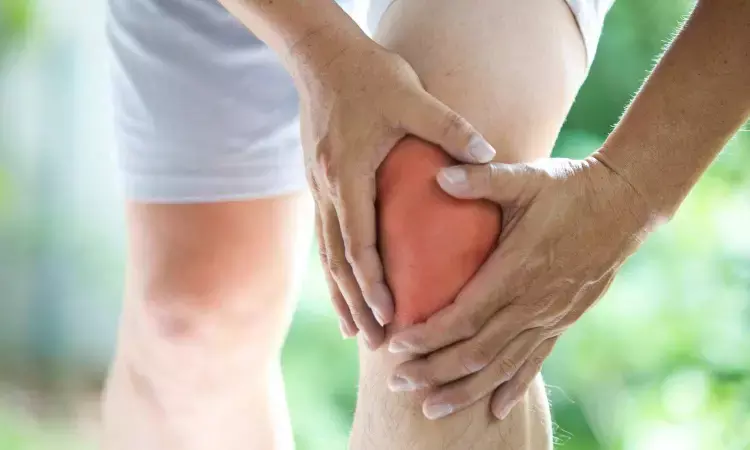- Home
- Medical news & Guidelines
- Anesthesiology
- Cardiology and CTVS
- Critical Care
- Dentistry
- Dermatology
- Diabetes and Endocrinology
- ENT
- Gastroenterology
- Medicine
- Nephrology
- Neurology
- Obstretics-Gynaecology
- Oncology
- Ophthalmology
- Orthopaedics
- Pediatrics-Neonatology
- Psychiatry
- Pulmonology
- Radiology
- Surgery
- Urology
- Laboratory Medicine
- Diet
- Nursing
- Paramedical
- Physiotherapy
- Health news
- Fact Check
- Bone Health Fact Check
- Brain Health Fact Check
- Cancer Related Fact Check
- Child Care Fact Check
- Dental and oral health fact check
- Diabetes and metabolic health fact check
- Diet and Nutrition Fact Check
- Eye and ENT Care Fact Check
- Fitness fact check
- Gut health fact check
- Heart health fact check
- Kidney health fact check
- Medical education fact check
- Men's health fact check
- Respiratory fact check
- Skin and hair care fact check
- Vaccine and Immunization fact check
- Women's health fact check
- AYUSH
- State News
- Andaman and Nicobar Islands
- Andhra Pradesh
- Arunachal Pradesh
- Assam
- Bihar
- Chandigarh
- Chattisgarh
- Dadra and Nagar Haveli
- Daman and Diu
- Delhi
- Goa
- Gujarat
- Haryana
- Himachal Pradesh
- Jammu & Kashmir
- Jharkhand
- Karnataka
- Kerala
- Ladakh
- Lakshadweep
- Madhya Pradesh
- Maharashtra
- Manipur
- Meghalaya
- Mizoram
- Nagaland
- Odisha
- Puducherry
- Punjab
- Rajasthan
- Sikkim
- Tamil Nadu
- Telangana
- Tripura
- Uttar Pradesh
- Uttrakhand
- West Bengal
- Medical Education
- Industry
Repeat injection of a liposomal formulation of steroid shows promise in knee osteoarthritis: Study

Australia: A phase III randomized controlled trial revealed that two intra-articular injections of a liposomal formulation of dexamethasone given six months apart provided pain relief for patients with osteoarthritis (OA) of the knee. The study findings were presented at the annual meeting of the American College of Rheumatology (ACR).
After the first dose, there was a reduction in average daily pain (ADP) levels by half in patients receiving the investigational product called TLC599, and this was significantly greater than placebo. The second injection boosted the pain relief even more, such that ADP scores declined an additional full point on the index's 10-point scale, David Hunter, MBBS, MSc, of the University of Sydney in Australia, told the attendees.
There was a slight rebound in the pain over the final months of the year-long study, but the average ADP score was still lower at week 52 than just before the second injection was given.
Steroid injections are commonly used for knee OA treatment, but the effects are not long-lasting and many clinicians are reluctant to give repeat doses. One approach is the development of long-acting formulations. Another trial reported at the ACR meeting investigated a polymer-coated version of fluticasone, previously best known for its inhalable formulation for asthma. TLC599 represents a similar approach that uses lipid bubbles to encapsulate the steroid for extended-release.
Dr. Hunter and colleagues included 504 patients with moderate knee OA (Kellgren-Lawrence grade 2/3). They were randomized in the ratio of 2:1:1 to the following treatment regimens: TLC599 (n=252), placebo (n=126); and regular dexamethasone sodium phosphate.
Each participant was delivered in a single injection to one knee at week 0 and then again at week 24 at the participants' option. Roughly three-quarters of each group requested a repeat injection. The mean age of the participants was 60. Body mass index (BMI) values averaged 31, and a little more than half of patients were women.
The 4-point Western Ontario McMaster University Osteoarthritis Index (WOMAC) score for pain was a secondary endpoint besides ADP.
The researchers reported the following findings:
- All three treatment arms saw substantial drops in this pain score 1 week after the first dose, by a full point in the regular dexamethasone and TLC599 groups, and 0.8 points with placebo, all from baseline means of 2.2-2.3.
- Some pain returned over the following 6 months but remained well below baseline.
- The absolute decline in WOMAC pain score met a standard threshold for clinical significance. However, the difference between the TLC599 and placebo groups was well short of that because of the strong placebo response.
- The only adverse event was increased reports of pain in the injected joint immediately following the TLC599 shots relative to the other treatments.
- Other adverse events appeared unconnected to treatment or were typical of any intra-articular injection. TLC599 was "generally well tolerated.
According to Hunter, there was no clarity on why throughout the study period, regular dexamethasone largely matched the liposomal formulation. However, he noted that the same phenomenon was seen in a trial of extended-release triamcinolone: it provided substantial pain relief lasting several months, but injections of regular triamcinolone did just as well.
"These results provide additional information about the benefits of repeat steroid injection in knee osteoarthritis and indicate that TLC599 may provide prolonged benefit and offer an alternative treatment for the OA knee pain management," the researchers concluded.
Reference:
Spencer-Green G, et al "A phase 3 study of repeat injection of TLC599 in osteoarthritis of the knee: benefits to 52 weeks" ACR 2023; Abstract L19.
Dr Kamal Kant Kohli-MBBS, DTCD- a chest specialist with more than 30 years of practice and a flair for writing clinical articles, Dr Kamal Kant Kohli joined Medical Dialogues as a Chief Editor of Medical News. Besides writing articles, as an editor, he proofreads and verifies all the medical content published on Medical Dialogues including those coming from journals, studies,medical conferences,guidelines etc. Email: drkohli@medicaldialogues.in. Contact no. 011-43720751


